Hyundai Santa Fe vs Volvo XC60 - Differences and prices compared
Compare performance (288 HP vs 455 HP), boot space and price (51200 £ vs 49200 £ ) at a glance. Find out which car is the better choice for you – Hyundai Santa Fe or Volvo XC60?
Costs and Efficiency:
Looking at overall running costs, both models reveal some interesting differences in everyday economy.
Volvo XC60 has a barely noticeable advantage in terms of price – it starts at 49200 £ , while the Hyundai Santa Fe costs 51200 £ . That’s a price difference of around 2023 £.
Fuel consumption also shows a difference: Volvo XC60 manages with 2.80 L and is therefore clearly perceptible more efficient than the Hyundai Santa Fe with 3.80 L. The difference is about 1 L per 100 km.
As for electric range, the Volvo XC60 performs distinct better – achieving up to 82 km, about 28 km more than the Hyundai Santa Fe.
Engine and Performance:
Power, torque and acceleration are the classic benchmarks for car enthusiasts – and here, some clear differences start to show.
When it comes to engine power, the Volvo XC60 has a evident edge – offering 455 HP compared to 288 HP. That’s roughly 167 HP more horsepower.
In acceleration from 0 to 100 km/h, the Volvo XC60 is clearly quicker – completing the sprint in 4.90 s, while the Hyundai Santa Fe takes 8 s. That’s about 3.10 s faster.
In terms of top speed, the Hyundai Santa Fe performs minimal better – reaching 196 km/h, while the Volvo XC60 tops out at 180 km/h. The difference is around 16 km/h.
There’s also a difference in torque: Volvo XC60 pulls convincingly stronger with 709 Nm compared to 380 Nm. That’s about 329 Nm difference.
Space and Everyday Use:
Whether family car or daily driver – which one offers more room, flexibility and comfort?
Seats: Hyundai Santa Fe offers noticeable more seating capacity – 7 vs 5.
In curb weight, Volvo XC60 is minimal lighter – 1900 kg compared to 1920 kg. The difference is around 20 kg.
In terms of boot space, the Hyundai Santa Fe offers distinct more room – 711 L compared to 483 L. That’s a difference of about 228 L.
In maximum load capacity, the Hyundai Santa Fe performs clearly perceptible better – up to 2032 L, which is about 489 L more than the Volvo XC60.
When it comes to payload, Hyundai Santa Fe slightly takes the win – 665 kg compared to 550 kg. That’s a difference of about 115 kg.
Who comes out on top?
Overall, the Volvo XC60 shows itself to be outperforms in nearly all aspects and secures the title of DriveDuel Champion.
It convinces with the more balanced overall package and proves to be the more versatile choice for everyday use.
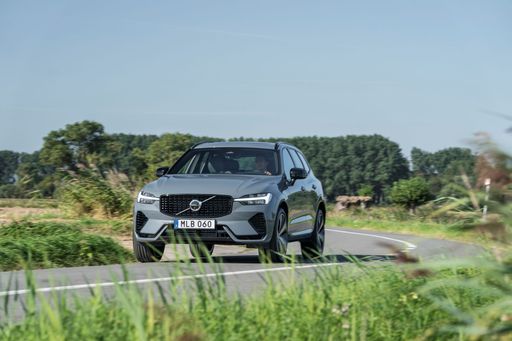
Volvo XC60
Costs and Consumption
View detailed analysis
Engine and Performance
View detailed analysis
Dimensions and Body
View detailed analysis
Hyundai Santa Fe
The Hyundai Santa Fe blends practical family friendliness with a hint of premium style, offering roomy, sensible packaging wrapped in modern, confident design. Inside it serves up comfortable seats, straightforward tech and a calm, composed ride that makes daily drives feel a little more grown up — a solid all‑rounder that doesn’t try to be flashy.
details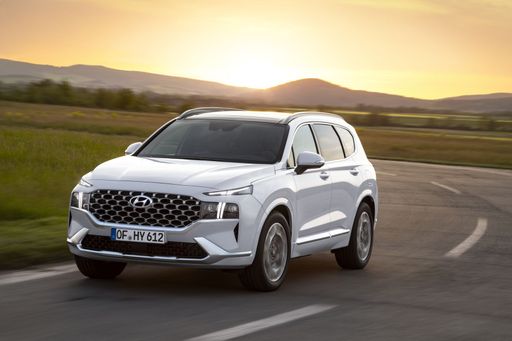
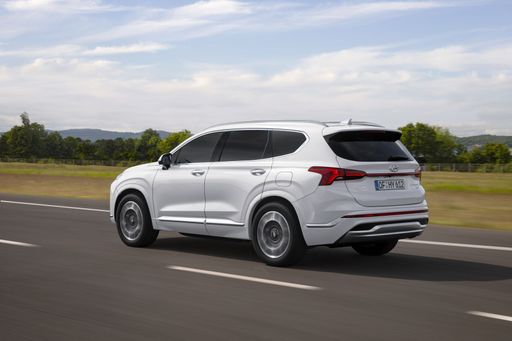

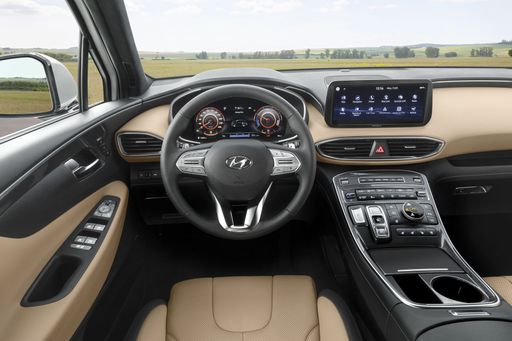
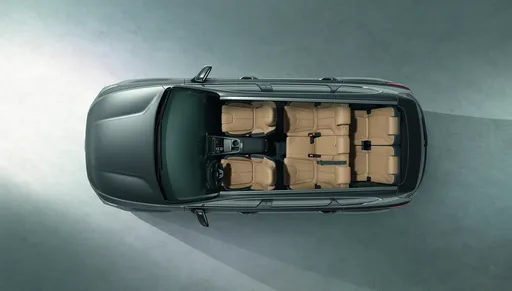
Volvo XC60
The Volvo XC60 blends Scandinavian calm with confident presence, offering a cabin that feels plush without shouting for attention. It’s a smart pick for buyers after a composed ride, clever practicality and thoughtful safety touches — it even makes running the family shuttle feel almost serene, which is a small miracle.
details
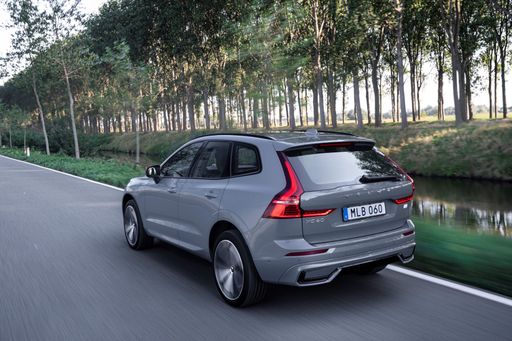
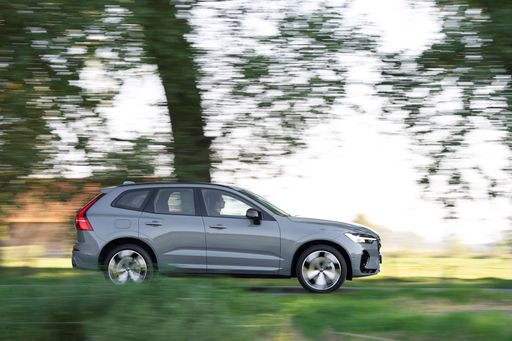
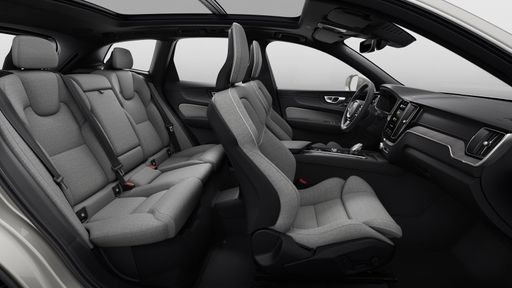
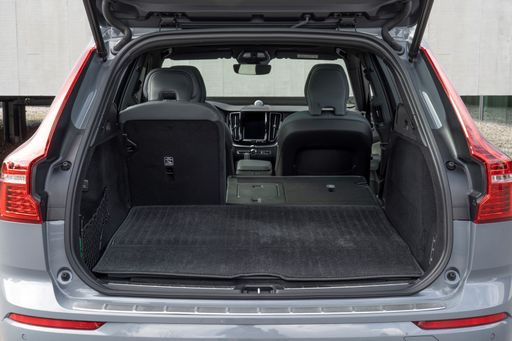
Costs and Consumption |
|
|---|---|
|
Price
51200 - 58600 £
|
Price
49200 - 75100 £
|
|
Consumption L/100km
3.8 - 7.1 L
|
Consumption L/100km
2.8 - 7.5 L
|
|
Consumption kWh/100km
-
|
Consumption kWh/100km
-
|
|
Electric Range
54 km
|
Electric Range
74 - 82 km
|
|
Battery Capacity
-
|
Battery Capacity
14.70 kWh
|
|
co2
90 - 160 g/km
|
co2
64 - 169 g/km
|
|
Fuel tank capacity
67 L
|
Fuel tank capacity
71 L
|
Dimensions and Body |
|
|---|---|
|
Body Type
SUV
|
Body Type
SUV
|
|
Seats
5 - 7
|
Seats
5
|
|
Doors
5
|
Doors
5
|
|
Curb weight
1920 - 2165 kg
|
Curb weight
1900 - 2150 kg
|
|
Trunk capacity
621 - 711 L
|
Trunk capacity
468 - 483 L
|
|
Length
4830 mm
|
Length
4708 mm
|
|
Width
1900 mm
|
Width
1902 mm
|
|
Height
1720 mm
|
Height
1651 - 1655 mm
|
|
Max trunk capacity
1949 - 2032 L
|
Max trunk capacity
1528 - 1543 L
|
|
Payload
560 - 665 kg
|
Payload
510 - 550 kg
|
Engine and Performance |
|
|---|---|
|
Engine Type
Full Hybrid, Plugin Hybrid
|
Engine Type
Petrol MHEV, Plugin Hybrid
|
|
Transmission
Automatic
|
Transmission
Automatic
|
|
Transmission Detail
Automatic Gearbox
|
Transmission Detail
Automatic Gearbox
|
|
Drive Type
Front-Wheel Drive, All-Wheel Drive
|
Drive Type
All-Wheel Drive
|
|
Power HP
239 - 288 HP
|
Power HP
250 - 455 HP
|
|
Acceleration 0-100km/h
8 - 9.2 s
|
Acceleration 0-100km/h
4.9 - 6.9 s
|
|
Max Speed
196 km/h
|
Max Speed
180 km/h
|
|
Torque
380 Nm
|
Torque
350 - 709 Nm
|
|
Number of Cylinders
4
|
Number of Cylinders
4
|
|
Power kW
176 - 212 kW
|
Power kW
184 - 335 kW
|
|
Engine capacity
1598 cm3
|
Engine capacity
1969 cm3
|
General |
|
|---|---|
|
Model Year
2025
|
Model Year
2025
|
|
CO2 Efficiency Class
E, F, B
|
CO2 Efficiency Class
F, B
|
|
Brand
Hyundai
|
Brand
Volvo
|
What drivetrain options does the Hyundai Santa Fe have?
Available configurations include Front-Wheel Drive or All-Wheel Drive.




